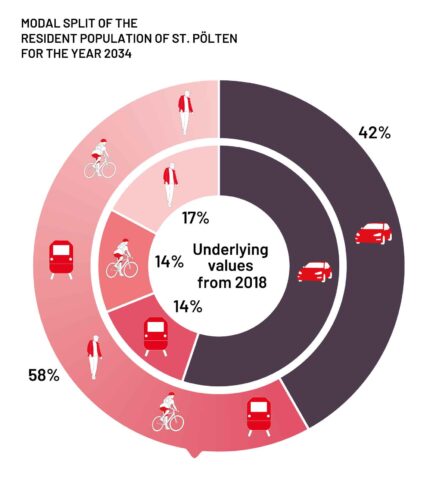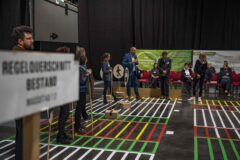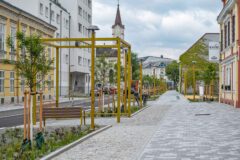St. Pölten, the capital of Lower Austria, the largest province in the country by area, is undergoing a dynamic process of change. The city has become particularly attractive since the expansion of the Vienna–Salzburg railway line and the good transport connections. However, a construction boom, a growing population and heavy commuter traffic are giving the city much to do and calling for new technical and social infrastructure. As a climate neutrality pioneer, the city is putting many innovative measures in motion – and one key issue is the mobility transformation.
“Although the climate crisis has definitely been a factor in the urban development concept, in residential development and in transport planning in recent years, there hasn’t been an overarching strategy,” explains Carina Wenda, who is in charge of sustainable planning processes in the city’s new Climate Coordination Office. With its “Climate framework strategy 1.0”, which was devised as part of the national Fit4UrbanMission funding project, the city bolstered its foundations for climate-resilient development back in 2022. “This brought all the relevant issues together for the first time and made it clear which specialist departments had to be brought on board on the journey to climate neutrality. However, our “Climate framework strategy 1.0” is also an important means of raising awareness,” Wenda emphasises.
Building capacity
Joining the mission “Climate-neutral City” as a pioneering city is allowing St. Pölten to recruit additional staff and expand its skills base. It is this that has enabled the establishment of the Climate Coordination Office, for instance. “This is where the ‘pioneering cities’ initiative is having its greatest impact, we think,” says the project lead. “We’ve been able to give new staff new responsibilities and thus cover key areas that had previously fallen by the wayside somewhat. Needless to say, we’re working very closely with many other departments, such as Urban Planning and Transport Planning.”
Focusing on energy
The topic of energy is an important focus that the pioneer city team is working on intensively. Two municipal renewable energy communities have already been set up, while preparations are currently under way for citizen energy communities and for drawing up a concept for regional energy planning. Several photovoltaic projects are also on the verge of being implemented.
Sustainable district development
The city has partnered with ÖBB Infra and Alpenland, a non-profit building and housing cooperative. Both are currently planning pilot projects in St. Pölten for building new districts or renovating existing ones using innovative mobility and energy solutions. For instance, ÖBB’s plans to renovate the “Eisenbahnerhöfe” are already well advanced. This former estate was built to house railway workers and features a number of listed buildings. One of Alpenland’s projects, meanwhile, involves building a new neighbourhood on a brownfield site featuring high-density housing and mixed-use buildings. “We on the city council don’t build anything ourselves, of course, so we’re reliant on the willingness of our developers to cooperate,” Wenda explains. “We’re glad to have ÖBB and Alpenland working with us on this in order to set something in motion together.”
Championing the mobility transformation
Transforming its transport policy is a key issue that St. Pölten is actively working on, and the city’s firm commitment is reflected in its overall concept for active mobility, which was signed off by the city council earlier this year. The concept sets out some important measures for accelerating the switch from driving to walking and cycling. By 2034, the aim is for ecomobility (walking, cycling, public transport) to make up 58% and motorised individual transport (MIT) 42% of the modal split.

The overall concept for active mobility was devised in a broad-based participatory process that involved over 2,000 people. “We’re very proud of a number of things, including our NextBike bike-sharing scheme, which is proving extremely popular with the public,” Wenda explains. “Rental numbers doubled last year. This tells us that we in St. Pölten have the potential to become a sustainable mobility pioneer.” Boosting public transport is another big issue, with an important planning process currently ongoing in this regard. Because St. Pölten does not have a transport operator of its own – the municipal bus network LUP is run by the Verkehrsverbund Ost-Region (VOR) – the city works closely with VOR and is in the process of preparing an invitation to tender for 2027 in a bid to expand its bus network, increase service frequency and convert the fleet to electric buses from 2029 onwards.
Carina Wenda, Climate Coordination Office,
St. Pölten City Council



